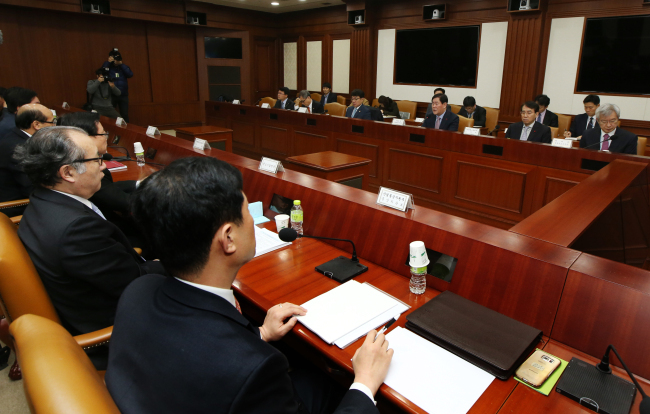Rival parties on Friday agreed to move closer to a vote on the ratification of a free trade agreement between South Korea and China during a plenary session scheduled for Monday next week.
While the two sides remained separated over the ramifications of the pact, the ruling Saenuri Party and main opposition New Politics Alliance for Democracy agreed to hold a consultative meeting with the government and the relevant committee early on Monday in hopes of a breakthrough.
 |
| (Yonhap) |
The agreement was made as the plenary session Friday was postponed, with the floor leaders of the two parties meeting for breakfast along with Finance Minister Choi Kyung-hwan.
With the NPAD set on opposing the pact unless the government implements stronger measures to compensate the agriculture and fisheries sectors, the Saenuri Party has said it would still go ahead with the vote using its majority status.
The pact must pass through the foreign affairs and trade committee before being put to a plenary vote. With the ruling party lawmakers accounting for 60 percent of the 23-member committee, they can unilaterally pass the bill.
The FTA with China was signed on June 1.
The Saenuri Party also said along with the trade pact with China, they will move to complete the legislative process for other pending FTA-related bills involving Vietnam, New Zealand and Turkey.
Cheong Wa Dae urged lawmakers to keep to the schedule.
“It is regretful that the plenary session slated to open today was canceled. Although it is already late, we earnestly urge the National Assembly to ratify the FTA on Nov. 30 that would greatly contribute to the public livelihood and economy,” presidential spokesman Jeong Yeon-guk said.
The Saenuri Party has been asserting that the Friday session would be the last opportunity to have the agreement take effect within this year, as officials from Seoul and Beijing need time to prepare the administrative steps for implementation.
The party has so far pledged to provide subsidies worth 1 trillion won ($870 million) to sectors such as the agriculture industry. The government has also highlighted that early implementation of the pact would allow Korean companies to enjoy the full benefits of the pact’s tariff cut scheme.
The NPAD has urged the government to increase subsidies and prepare measures to protect the suffering agricultural, fishing and dairy industries likely to suffer further setbacks from the trade pact.
By Yeo Jun-suk (jasonyeo@heraldcorp.com)

